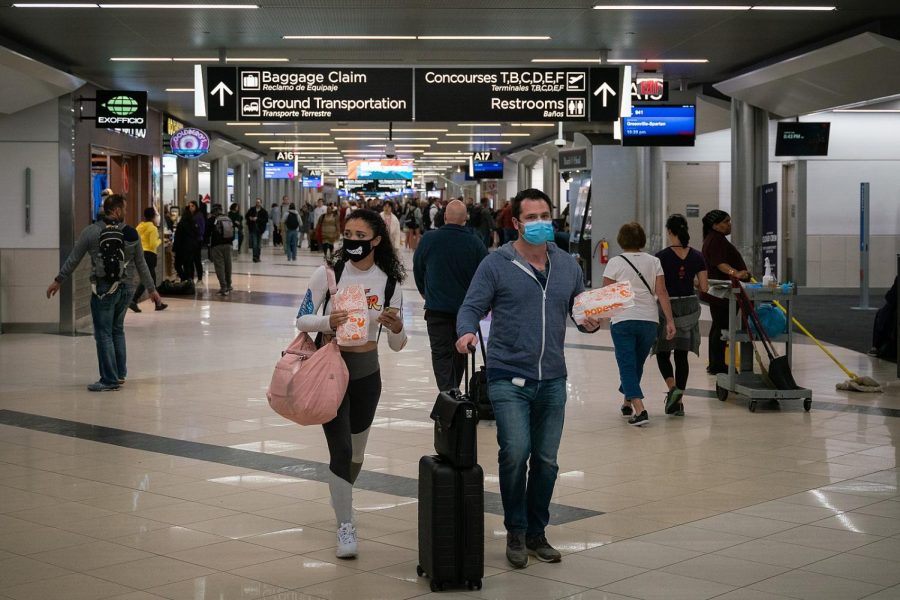United Airlines Cuts Flights by 50%, U.S. Issues Travel Ban to Combat Spread of Coronavirus
Chad Davis on Wikimedia Commons
United Airlines plans to cut flights by 50% as bookings fall amidst panic and other airlines such as Delta are following suit, according to USA Today. Creative Commons image: Chad Davis on Wikimedia Commons.
March 23, 2020
As the COVID-19 pandemic progresses, Menlo students might not be immediately worried about what comes with contracting the virus, but their travel plans likely have been or will be affected. Cases of the virus have already been reported in 167 countries and regions according to the Center for Systems Science and Engineering (CSSE) at Johns Hopkins University as of March 23.
Transmission of the virus has raised questions about whether it is safe to travel on planes, and hours-long lines and risks of being quarantined have made travelers hesitant about their trips. Many might be wondering if modes of transportation such as airplanes or trains are dangerous and whether they should cancel trips, even to low-risk countries. According to the World Health Organization, you have had contact with an infected person if you are sitting within two airplane rows of them. But, moving around the cabin and being in close proximity to others in crowded airports increases your likelihood of contraction.
Respiratory viruses can be transmitted a variety of different ways, including through the air in particles, or through surfaces that someone who is infected has touched. The Centers for Disease Control and Prevention (CDC) recommends that travelers practice increased precautions such as normal procedures like washing hands thoroughly and avoiding close contact with others.
United Airlines plans to cut flights by 50% as bookings fall amidst panic and other airlines such as Delta are following suit, according to USA Today. United carried one million fewer passengers in the first two weeks of March compared with a year ago. It expects March revenue to be $1.5 billion lower than March 2019.
The CDC has issued a level-three travel health notice for China, Iran, the United Kingdom and Ireland, and the majority of European countries, as of March 15. The CDC says that a level-three warning means that they recommend that travelers avoid all nonessential travel to a particular country. Recommendations include that travelers returning from these high-risk countries “should stay home for 14 days after returning to the United States and practice social distancing” and those “that are sick with fever, cough, or have trouble breathing should call ahead before seeking medical care.”
The United States has also issued a travel ban to these countries as a precaution. The travel ban to China and Iran was issued in early March then later extended to the European Union and the United Kingdom. Other countries have taken more drastic measures, such as Kenya that isn’t allowing travelers from any countries that have reported COVID-19, and citizens returning home will be allowed in “with self-quarantine or government-designated facility,” according to the Kenyan Ministry of Health. Prime Minister Justin Trudeau has also elected to shut the border to non-Canadian citizens, with limited exceptions as he said in an address to reporters in Ottawa on March 16.
In order to further prevent the spread of the disease, some companies are discouraging travel for their employees, and the head of Whitman College has issued a notice to their students, strongly discouraging travel over the university’s spring break. Whitman College President Kathy Murray said in the notice they want to “limit the possibility of exposing members of our community to COVID-19,” and keep their students safe as “the situation is changing rapidly and there is a chance that if you leave campus you may be unable to return due to travel restrictions. Countries and regions may enact restrictions and even quarantines with little advance warning.”
Menlo has already canceled school-sponsored travel, including all Menlo Abroad trips, the varsity boys lacrosse trip to New York and the Mock Trial trip to Los Angeles. “[During a Menlo Abroad trip], we would be in a country with systems so overwhelmed dealing with COVID-19 cases that if students had some sort of issue where they needed medical attention, the medical facilities could be overwhelmed and unable to care for our students,” said Global Programs Director Peter Brown.



